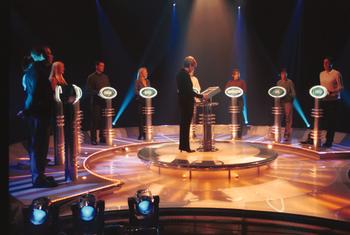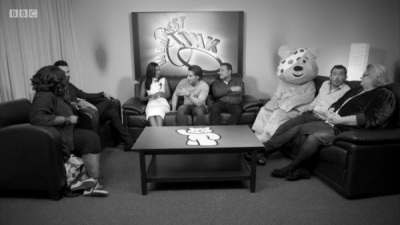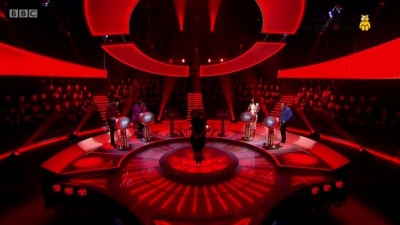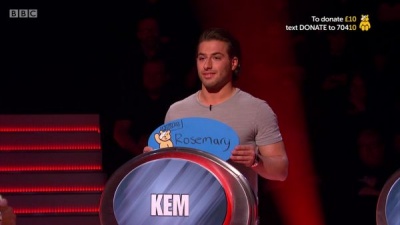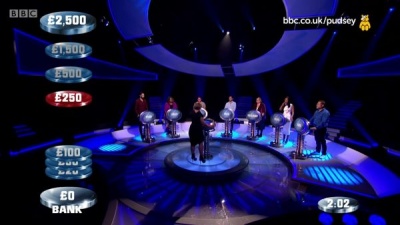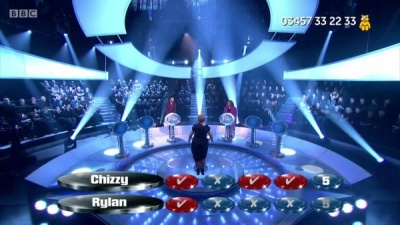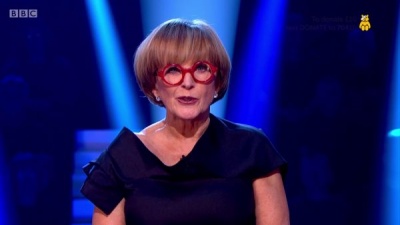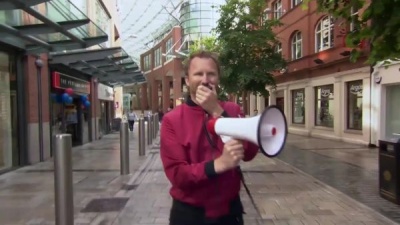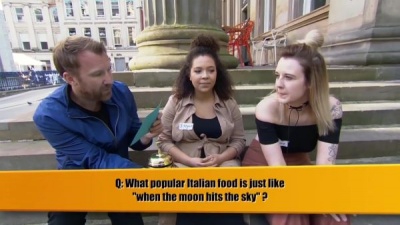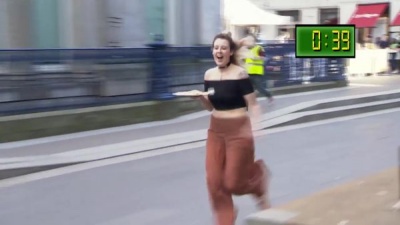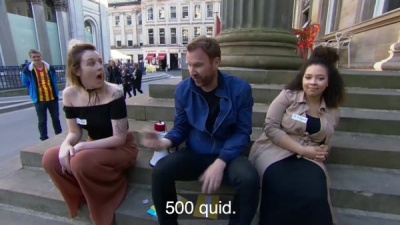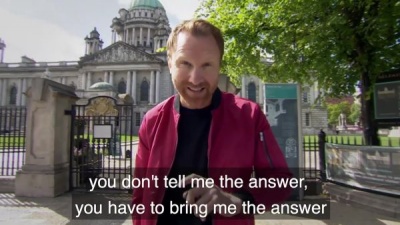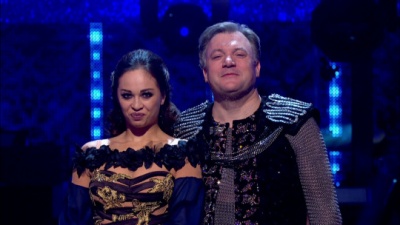Weaver's Week 2017-11-26
Last week | Weaver's Week Index | Next week
Five and a half years ago, we said "goodbye" to The Weakest Link. We thought it had gone forever. But it's back.
Contents |
The Weakest Link
BBC Studios in association with Goodbye Television for BBC2, 17 November
When it came on air in 2000, The Weakest Link was something new. Anne Robinson was nasty. Throughout the twentieth century, hosts and quizmasters had appeared to be on the contestants' side. Robinson wanted the contestants to go away hating her, and hating each other.
This was a claustrophobic, dark, intense world. Nothing short of perfection would stop the host's ceaseless complaints, and even then praise would be grudging.
After each round, there's a vote to decide who should leave. "You have won twenty pounds; you could have won £1000. Why aren't you winning more? Who would be better off watching the television rather than appearing on it?"
And then Robinson asks the most difficult question: John, why did you vote for Nick? Whatever answer John gives, he's giving it in front of Nick. The sniping and cross talk ends, with the programme's catchphrase. "You are the weakest link. Goodbye."
The show hit its peak in the first year or so, and it was downhill all the way after that. They could have ended The Weakest Link a lot sooner than they did, but it never felt like Anne Robinson was going through the motions. In all of these respects, Link had a similar trajectory to Deal or No Deal, huge for a bit, then fell off, and became part of the television furniture long before it finished.
We have a lot of affection for Link, perhaps heightened by the way it simply stopped. In March 2012, they were showing new episodes, in April it was off the telly entirely.{1} The Weakest Link hasn't been on the Challenge channel, clips weren't used in "I Remember Last Tuesday". In the modern media landscape, if you're not constantly reminded that something existed, it falls from memory very soon.
Link it back
So we were interested by the BBC's attempt to revive The Weakest Link, as a one-off for its Children in Need charity appeal. We hope the good causes got a lot of money from viewer donations. We're going to review the show on its own merits, as a piece of television entertainment.
As it's a celebrity edition, they've brought in a studio audience. We always found the audience removed something from the show. Regular episodes feature Anne Robinson and no-one else, it's as if the intrepid contestants had gone into the evil witch's castle and were being tortured in her sadistic dungeons.
The Weakest Link had some wonderful visual flourishes, and didn't over-use them. Robinson stood at the centre of the stage, with a long flowing cape flapping behind her, and swivelled round to face her next victim. The aesthetic was gothic, fear and tension and actual vengeance. With an audience, that atmosphere is lost. Anne and her chums are playing a quizzy game. We cannot forget that it's an entertainment.
The music remained, which is great news. Paul Farrer's score flowed along quietly, increasing in pitch and tempo during the round, before exploding in a discordant burst of noise. It mirrored the show perfectly, though we wonder if they've changed some of the cues around the voting.
Contestants are contestants. Something for older viewers – actor John Thomson and cook Rosemary Shrager. Something for the young – Kem Cetinay from Love Island, Rylan Clark-Neal from Big Brother, Maya Jama from Cannonball. And some BBC faces – Chizzy Akudolu from Holby City, Giles Coren from The Supersizers. A few might be there to support the charity, many could win.
The show, sadly, wasn't as good as we remember it. Three particular problems spring to mind. Anne Robinson was always at her best with the put-downs, and the bits in the voting. She was never the best question-master. Robinson would talk a little too slowly, and her diction – always questionable – would sometimes mislead contestants. Age has not improved the performance. Robinson's questions were slow and ponderous, and we understand it took five takes for her to say "spectre" correctly.
If there's to be a full series out of this, we would seriously consider re-casting the host's role. Bother's Bar backs Robert Rinder, and we'd be fine with that. We already know that Giles Coren can ask questions at speed (hey, we watched 500 Questions), and we reckon he could play a curmudgeon.
Problem two: the money tree. The main game has a very clever chain: 20-50-100-200-300-450-600-800-1000. Double (or more) for the first three steps, then two steps of half-as-much-again, then three steps of a bit more. Assuming time is not a problem, it's never obvious whether to bank or press on.
Our celebrity show doesn't have nine players, it has seven. An unusual number of players, but not unprecedented. Back in 2001, BBC1 commissioned a handful of shows with seven players, intending to slot them into 40-minute gaps. The money chain respected the principles from the main show: 50-100-250-500-1000-1750-2500. Four steps doubling up, two steps of a bit more, and still the top is 50 times the bottom.
Did they use this successful idea? Er, no. They came up with another chain, 20-50-100-250-500-1500-2500. It's much steeper, but starts from such a low base that every value is lower. It's an actual example of a prize cut, they gave away more money in 2001 than in 2017.
This year's contestants won £1130, which was doubled to £2260 after the final. Under the 2001 rules, the exact same chains would have been worth £2400.
Problem three: it's hard to go back. When revisiting a classic show, there are two approaches. You can do a straight continuation of the story, allowing for the passage of time. Whatever Happened to The Likely Lads is a primetime example, taking a sitcom from ten years earlier and building a world on existing foundations. The initial appeal is nostalgia, and you've got to start on the new plot right from the start. Get it right – as Fifteen-to-One has done – and you could last for a very long time.
Or you can build a show that retains just enough familiar points to keep the old viewers, while bombarding the viewers with so much new stuff that newcomers aren't disadvantaged. Danger Mouse has used this technique, and The Crystal Maze is following the same path.
The Weakest Link isn't a straight continuation of the old series, everything felt a little rusty, as if it had gotten damp in storage. But nor did they try to build something fresh; ignore the questions, and this edition looked and felt like it could have gone out in 2007. A straight revival has a nostalgic appeal, but Blankety Blank proved that nostalgia won't last long.{2}
On the evidence before us, we don't think The Weakest Link needs another run. Keep it as a cherished memory, let it improve with age, absence makes the heart grow fonder.
{1} The Weakest Link hasn't been totally off screens since March 2012. Some recent episodes ran on BBC2 daytimes in 2013 while they sorted out contracts with actors. Irish-language station TG4 still broadcasts old episodes. Back to article
{2} More on these topics when we review the Raven revival in January. Back to article
Don't Say It, Bring It
Stellify Media for UKTV, shown on Dave, 13-24 November
Here's a very simple idea for a game show. Go out onto a busy street, and get contestants. Describe an object to them. The player's goal is to find that object and return to the host within a strict time limit. Just the one catch: the player cannot name the object they want.{3}
For instance, Jason Byrne (our host) might ask for something you'd put around your waist to hold up trousers. The answer – a belt – is the one word that must not pass the player's lips.
In the version on UKTV Dave, there's a money ladder- £50 for the first challenge, then £100, £250, £500, and £1000 for a really tough challenge. But it's all-or-nothing: take the challenge and get it wrong, and you leave with nothing more than a firm handshake from Jason Byrne.
Success proves to be elusive. It's one thing to lose because you didn't know the phrase "keen as mustard", perhaps another to be confused by the host's accent. It's very tough luck to lose because no-one in Bristol has brought their library card with them. We might prefer to see losers drop a place or two down the money tree, because it's very rare to see anyone play on past £250. And we expect contestants will get the description written down in a future series.
It's a diverting programme, it fits well with UKTV Dave's values. Jason is charming and witty, laughs with the contestants, and encourages them to laugh with each other. Jason's banter with his crew helps make the show feel like a club. The barrier to entry is low – you can join the episode halfway through and understand what's going on.
We can see further merit in Don't Say It, Bring It. A relatively cheap show – they can film a lot in one day, and the prizes are not huge. Slick editing and a brash style help to sell the show. And – if they make a few more editions – it'll be endlessly repeatable in the style of Come Dine with Me.
Only one problem: it's repeatable, but very repetitive. In this column's view, Don't Say It, Bring It would work well as an insert into another show, like In For a Penny from the last series of Takeaway. 22-minute episodes tax our patience, and we couldn't bear to watch two episodes back-to-back as UKTV scheduled them.
Don't Say It, Bring It has been hawked around the broadcasters for absolutely ages – we've found a showreel from 2012. We can understand why – the obvious place is in a show like Takeaway, and ITV doesn't want to license formats if it doesn't have to. There are a few rough edges, but it's a sound format, and we reckon Dave might be on to a good thing. Cheap bit of filler that can pop up whenever there's ten minutes to fill.
{3} For completeness, there are a few more rules. Can't steal it, can't buy it, may have to return it afterwards, the player will be miked up and followed by a couple of cameras – one Steadicam and one mounted on a crash helmet. Back to article
This Week and Next
There are such things as cultural touchstones, people and places that are significant to a shared society. A mere mention of their name is a shortcut for many greater ideas. On these islands, "Hastings" is a touchstone, an incompetent ruler getting an arrow in the eye. "Oxbridge", another touchstone, privilege and elitism and the class struggle. "Forsyth", a cheeky showman.
"Ed Balls" is another touchstone, known for taking over Willy Fog Day, and for his unforgettable performances on Strictly Come Dancing. Once seen, seared into memory like a branding iron. Everyone knows Ed Balls, right?
Wrong! One indomitable contestant on Round Britain Quiz has somehow evaded the whole of modern culture, and could not identify Ed Balls in a line-up. Even when the surrounding clues were decoded as "Great" and "Martin Offiah", the name just did not come.
The Calderdale Massive was not impressed. Noting that both "North of England" competitors (Stuart Maconie and Adele Geras) are from the other side of the Pennines, a suggestion was made. "Moar Yorkshire and less Manc." We agree.
Just one part of the BBC2 trinity this week. On University Challenge, St John's beat Corpus Christi by 285-80 in a Cambridge derby. A good side is beaten by an even better one.
BARB ratings in the week to 12 November.
- Blue Planet II topped the ratings (BBC1, Sun, 13.45m). Strictly Come Dancing still the top game show (BBC1, Sat 11.75m, Sun 11.45m).
- The X Factor continued (ITV, Sat, 5.4m), and barely beat Dick and Dom's Pointless Celebrities (BBC1, Sat, 5.05m). Have I Got News for You rolls on (BBC1, Fri, 4.55m).
- The Chase (ITV, Tue, 3.4m) is just ahead of Masterchef The Professionals (BBC2, Tue, 3.3m). University Challenge is still popular (BBC2, Mon, 3m) and Strictly It Takes Two broke 2.5 million (BBC2, Mon).
- On the diginets: Celebrity Juice miles clear at the top (ITV2, Thu, 1.3m). Then all the way to Four in a Bed (More4, Sun, 265,000) and Masterchef Down Under (W, Tue, 260,000).
- Four other big new shows: Landscape Artist (Artsworld, Wed, 205,000), Your Face or Mine (Comedy Central, Wed, 180,000), Takeshi's Castle Jonathan Ross (Comedy Central, Thu, 175,000), These Islands Next Top Model (Lifetime, Thu, 160,000).
Talent at all ends of the age spectrum this week. Junior Eurovision Song Contest (Fun Kids and TG4, Sun) is a song contest in its own right. The final weekend of The X Factor looms (ITV and TV3), and BBC1 strikes back for Partners in Rhyme with Lionel Blair (BBC1, Sat).
Photo credits: BBC Studios / Goodbye Television, Stellify Media.
To have Weaver's Week emailed to you on publication day, receive our exclusive TV roundup of the game shows in the week ahead, and chat to other ukgameshows.com readers, sign up to our Yahoo! Group.


